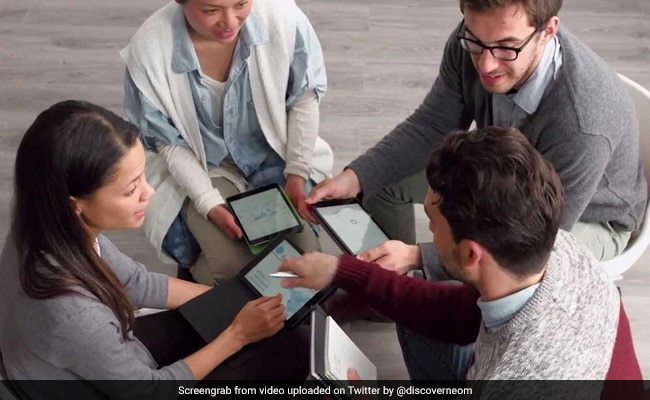
Prince Mohammed bin Salman said he wanted to turn Saudi Arabia into a more moderate version of Islam
Saudi Arabia is breaking into the city-building business.
This week, the country's crown prince announced plans to build a "futuristic city" run entirely on alternative energy. Some other things will be different, too. The flashy promotional video features women running in sports bras and working side by side with men, often without the head-covering hijab.
If (and that's a big if) this city actually comes to pass, it would augur a major shift in how Saudi women live. Until last month, Saudi Arabia was the only country where women were not allowed to drive. Male guardians in the kingdom still have the final say on whom a woman can marry and even where she travels.
In the speech Tuesday, Crown Prince Mohammed bin Salman stressed that he wanted to turn his country toward a more moderate version of Islam and that he'd push for the social reforms that would accompany such a transition. "We were not like this in the past," he said. "We want to go back to what we were: moderate Islam."
The $500 billion project, dubbed "Neom," imagines a supercity that would stretch 10,230 square miles. It is intended to be a hub for technological innovation, funded by the government as well as private and international investors. "This place is not for conventional people or conventional companies," Mohammed told an audience of investors gathered in Riyadh. "This will be a place for the dreamers of the world."
To take one example: The prince imagined a place where drones, driverless cars and robotics might work together to ensure there's no traffic. He promised, too, that investors would make healthy returns somehow. Mohammed also envisioned cutting-edge research into energy and water, along with biotechnology, food and manufacturing.
"Neom" is part of a broader effort to diversify the Saudi economy, which is largely dependent on oil exports. Most Saudis hold jobs with the government, and the public-sector wage bill makes up about half of the country's total expenditure. By 2030, Saudi Arabia wants to trim that by about 20 percent, which would mean that there's a need for rapid private-sector growth.
(Except for the headline, this story has not been edited by NDTV staff and is published from a syndicated feed.)
This week, the country's crown prince announced plans to build a "futuristic city" run entirely on alternative energy. Some other things will be different, too. The flashy promotional video features women running in sports bras and working side by side with men, often without the head-covering hijab.
If (and that's a big if) this city actually comes to pass, it would augur a major shift in how Saudi women live. Until last month, Saudi Arabia was the only country where women were not allowed to drive. Male guardians in the kingdom still have the final say on whom a woman can marry and even where she travels.
In the speech Tuesday, Crown Prince Mohammed bin Salman stressed that he wanted to turn his country toward a more moderate version of Islam and that he'd push for the social reforms that would accompany such a transition. "We were not like this in the past," he said. "We want to go back to what we were: moderate Islam."
The $500 billion project, dubbed "Neom," imagines a supercity that would stretch 10,230 square miles. It is intended to be a hub for technological innovation, funded by the government as well as private and international investors. "This place is not for conventional people or conventional companies," Mohammed told an audience of investors gathered in Riyadh. "This will be a place for the dreamers of the world."
To take one example: The prince imagined a place where drones, driverless cars and robotics might work together to ensure there's no traffic. He promised, too, that investors would make healthy returns somehow. Mohammed also envisioned cutting-edge research into energy and water, along with biotechnology, food and manufacturing.
"Neom" is part of a broader effort to diversify the Saudi economy, which is largely dependent on oil exports. Most Saudis hold jobs with the government, and the public-sector wage bill makes up about half of the country's total expenditure. By 2030, Saudi Arabia wants to trim that by about 20 percent, which would mean that there's a need for rapid private-sector growth.
(Except for the headline, this story has not been edited by NDTV staff and is published from a syndicated feed.)
Track Latest News Live on NDTV.com and get news updates from India and around the world

